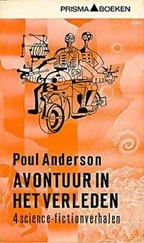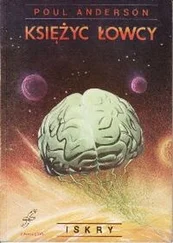Poul Anderson - How to Be Ethnic in One Easy Lesson
Здесь есть возможность читать онлайн «Poul Anderson - How to Be Ethnic in One Easy Lesson» весь текст электронной книги совершенно бесплатно (целиком полную версию без сокращений). В некоторых случаях можно слушать аудио, скачать через торрент в формате fb2 и присутствует краткое содержание. Жанр: Фантастика и фэнтези, на английском языке. Описание произведения, (предисловие) а так же отзывы посетителей доступны на портале библиотеки ЛибКат.
- Название:How to Be Ethnic in One Easy Lesson
- Автор:
- Жанр:
- Год:неизвестен
- ISBN:нет данных
- Рейтинг книги:5 / 5. Голосов: 1
-
Избранное:Добавить в избранное
- Отзывы:
-
Ваша оценка:
- 100
- 1
- 2
- 3
- 4
- 5
How to Be Ethnic in One Easy Lesson: краткое содержание, описание и аннотация
Предлагаем к чтению аннотацию, описание, краткое содержание или предисловие (зависит от того, что написал сам автор книги «How to Be Ethnic in One Easy Lesson»). Если вы не нашли необходимую информацию о книге — напишите в комментариях, мы постараемся отыскать её.
How to Be Ethnic in One Easy Lesson — читать онлайн бесплатно полную книгу (весь текст) целиком
Ниже представлен текст книги, разбитый по страницам. Система сохранения места последней прочитанной страницы, позволяет с удобством читать онлайн бесплатно книгу «How to Be Ethnic in One Easy Lesson», без необходимости каждый раз заново искать на чём Вы остановились. Поставьте закладку, и сможете в любой момент перейти на страницу, на которой закончили чтение.
Интервал:
Закладка:
How to Be Ethnic in One Easy Lesson
Poul Anderson
Adzel talks a lot about blessings in disguise, but this disguise was impenetrable. In fact, what Simon Snyder handed me was an exploding bomb.
I was hard at study when my phone warbled. That alone jerked me half out of my lounger. I’d set that instrument to pass calls from no more than a dozen people, to all of whom I’d explained that they shouldn’t bother me about anything much less urgent than a rogue planet on a collision course.
You see, my preliminary tests for the Academy were coming up soon. Not the actual entrance exams—I’d face those a year hence—but the tests as to whether I should be allowed to apply for admission. You can’t blame that policy on the Brotherhood. Not many regular spaceman’s berths become available annually, and a hundred young Earthlings clamor for each of them. The ninety-nine who don’t make it…well, mostly they try to get work with some company which will maybe someday assign them to a post somewhere out-system; or they set their teeth and save their money till at last they can go as shepherded tourists.
At night, out above the ocean in my car, away from city glow, I’d look upward and be ripped apart by longing. As for the occasional trips to Luna—last time, several months before—I’d found my eyes running over at sight of that sky, when the flit was my sixteenth-birthday present.
And now tensor calculus was giving me trouble. No doubt the Education Central computer would have gotten monumentally bored, projecting the same stuff over and over on my screen, if it had been built to feel emotions. Is that why it hasn’t been?
The phone announced: “Freeman Snyder.”
You don’t refuse your principal counselor. His or her word has too much to do with the evaluation of you as a potential student by places like the Academy. “Accept,” I gulped. As his lean features flashed on: “Greeting, sir.”
“Greeting, Jim,” he said. “How are you?”
“Busy,” I hinted.
“Indeed. You are a rather intense type, eh? The indices show you’re apt to work yourself into the ground. A change of pace is downright necessary.”
Why are we saddled with specialists who arbitrate our lives on the basis of a psychoprofile and a theory? If I’d been apprenticed to a Master Merchant of the Polesotechnic League instead, he wouldn’t have given two snorts in vacuum about my “optimum developmental strategy.” He’d have told me, “Ching, do this or learn that”; and if I didn’t cut it satisfactorily, I’d be fired—or dead, because we’d be on strange worlds, out among the stars, the stars.
No use daydreaming. League apprenticeships are scarcer than hair on a neutron, and mostly filled by relatives. (That’s less nepotism for its own sake than a belief that kin of survivor types are more likely to be the same than chance-met groundhugger kids.) I was an ordinary student bucking for an Academy appointment, from which I’d graduate to service on regular runs and maybe, at last, a captaincy.
“To be frank,” Simon Snyder went on, “I’ve worried about your indifference to extracurricular activities. It doesn’t make for an outgoing personality, you know. I’ve thought of an undertaking which should be right in your orbit. In addition, it’ll be a real service, it’ll bring real credit, to—” he smiled afresh to pretend he was joking while he intoned—“the educational complex of San Francisco Integrate.”
“I haven’t time!” I wailed.
“Certainly you do. You can’t study twenty-four hours a day, even if a medic would prescribe the stim. Brains go stale. All work and no play, remember. Besides, Jim, this matter has its serious aspect. I’d like to feel I could endorse your altruism as well as your technological abilities.”
I eased my muscles, let the lounger mold itself around me, and said in what was supposed to be a hurrah voice: “Please tell me, Freeman Snyder.”
He beamed. “I knew I could count on you. You’ve heard of the upcoming Festival of Man.”
“Haven’t I?” Realizing how sour my tone was, I tried again. “I have.”
He gave me a pretty narrow look. “You don’t sound too enthusiastic.”
“Oh, I’ll tune in ceremonies and such, catch a bit of music and drama and whatnot, if and when the chance comes. But I’ve got to get these transformations in hyperdrive theory straight, or—”
“I’m afraid you don’t quite appreciate the importance of the Festival, Jim. It’s more than a set of shows. It’s an affirmation.” Yes, I’d heard that often enough before—too dismally often.
Doubtless you remember the line of argument the promoters used: “Humankind, gaining the stars, is in grave danger of losing its soul. Our extraterrestrial colonies are fragmenting into new nations, whole new cultures, to which Earth is scarcely a memory. Our traders, our explorers push ever outward, ever further away; and no missionary spirit drives them, nothing but lust for profit and adventure. Meanwhile the Solar Commonwealth is deluged with alien—nonhuman—influence, not only diplomats, entrepreneurs, students, and visitors, but the false glamour of ideas never born on man’s true home. We grant we have learned much of value from these outsiders. But much else has been unassimilable or has had a disastrously distorting effect, especially in the arts. Besides, they are learning far more from us. Let us proudly affirm that fact. Let us hark back to our own origins, our own variousness. Let us strike new roots in the soil from which our forebears sprang.”
A year-long display of Earth’s past—well, it’d be colorful, if rather fakey most of the time. I couldn’t take it more seriously than that. Space was where the future lay, I thought. At least, it was where I dreamed my personal future would lie. What were dead bones to me, no matter how fancy the costumes you put on them? Not that I scorned the past; even then, I wasn’t so foolish. I just believed that what was worth saving would save itself, and the rest had better be let fade away quietly.
I tried to explain to my counselor: “Sure, I’ve been told about ‘cultural pseudomorphosis’ and the rest. Really, though, Freeman Snyder, don’t you think the shoe is on the other foot? Like, well, I’ve got this friend from Woden, name of Adzel, here to learn planetology. That’s a science we developed; his folk are primitive hunters, newly discovered by us. He talks human languages too—he’s quick at languages—and lately he was converted to Buddhism and shouldn’t the Wodenites worry about being turned into imitation Earthlings?” My example wasn’t the best, because you can only humanize a four—and—a-half-meter-long dragon to a limited extent. Whether he knew that or not (who can know all the races, all the worlds we’ve already found in our small corner of this wonderful cosmos?)
Snyder wasn’t impressed. He snapped, “The sheer variety of extraterrestrial influence is demoralizing. Now I want our complex to make a decent showing during the Festival. Every department, office, club, church, institution in the Integrate will take part. I want its schools to have a leading role.”
“Don’t they, sir? I mean, aren’t projects under way?”
“Yes, yes, to a degree.” He waved an impatient hand. “Far less than I’d expect from our youth. Too many of you are spacestruck—” He checked himself, donned his smile again, and leaned forward till his image seemed ready to fall out of the screen. “I’ve been thinking about what my own students might do. In your case, I have a first-class idea. You will represent San Francisco’s Chinese community among us.”
“What?” I yelped. “Bu—but—”
“A very old, almost unique tradition,” he said. “Your people have been in this area for five or six hundred years.”
Читать дальшеИнтервал:
Закладка:
Похожие книги на «How to Be Ethnic in One Easy Lesson»
Представляем Вашему вниманию похожие книги на «How to Be Ethnic in One Easy Lesson» списком для выбора. Мы отобрали схожую по названию и смыслу литературу в надежде предоставить читателям больше вариантов отыскать новые, интересные, ещё непрочитанные произведения.
Обсуждение, отзывы о книге «How to Be Ethnic in One Easy Lesson» и просто собственные мнения читателей. Оставьте ваши комментарии, напишите, что Вы думаете о произведении, его смысле или главных героях. Укажите что конкретно понравилось, а что нет, и почему Вы так считаете.










